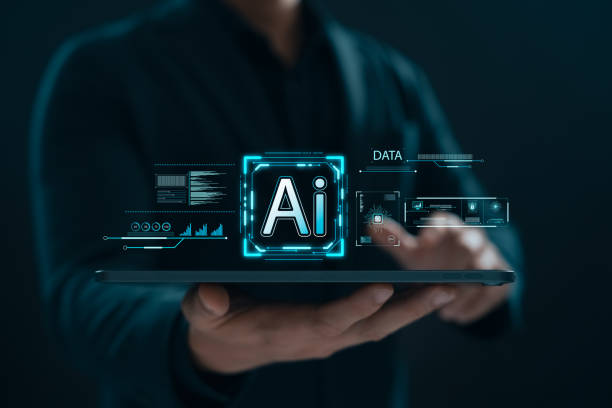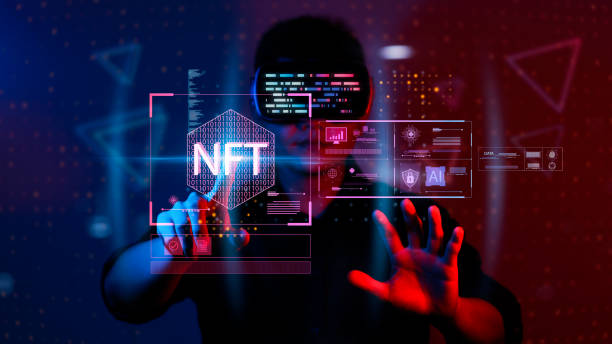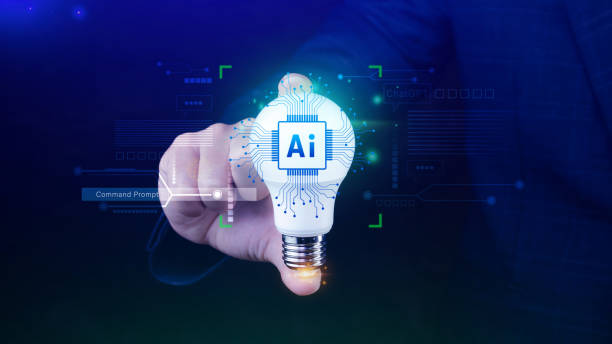### What is Artificial Intelligence and What Impact Does it Have on the Job Market?
[Image]
Artificial Intelligence (AI) is rapidly evolving and has a profound impact on the job market. This technology, which involves the development of systems that can perform tasks that typically require human intelligence, including learning, problem-solving, and decision-making, creates new opportunities and challenges for individuals and organizations. The future of work in the age of AI is a vital topic that needs attention. AI is not just a tool, but a transformative force that can change the way things are done. With ongoing advancements in this field, many traditional jobs are at risk of being replaced, while new and innovative jobs are also being created. In the meantime, a deep understanding of AI and how to interact with it will be key to success in the future job market. To better understand this issue, we need to examine various aspects of the impact of AI on different industries and the skills needed to adapt to these changes. For example, jobs that require repetition and processing large amounts of data are highly susceptible to automation, while jobs that require creativity, critical thinking, and interpersonal skills will become more valuable. Therefore, the future of work in the age of AI will move towards jobs with higher added value and requiring more human expertise.
> Are you annoyed by losing customers who visit your site to buy?
> Rasweb is your specialized solution for having a successful online store.
> ✅ Significant increase in your online sales
> ✅ Creating trust and professional branding with customers
> ⚡ Get free advice from Rasweb experts!
### Key Trends in the Future of Work in the Age of AI
[Image]
Several key trends are shaping the future of work in the age of AI. Automating repetitive tasks is one of the most important of these trends. AI can automatically perform many routine and repetitive tasks, leading to increased productivity and reduced costs. As a result, jobs that rely on these types of tasks may be at risk. On the other hand, the development of AI leads to the creation of new jobs that require expertise in areas such as machine learning, data science, and AI engineering. Also, the demand for experts who can integrate AI into various industries is increasing. The future of work in the age of AI is also affected by changes in the skills needed. While technical skills are still important, soft skills such as critical thinking, problem-solving, creativity, and collaboration are becoming more important. The future of work in the age of AI means that people must have the ability to learn continuously and adapt to new technologies. The future of work in the age of AI will increasingly depend on the ability to combine technical knowledge with human skills. Education and skills development play a vital role in preparing the workforce for these changes. Educational programs should focus on developing the skills needed in the age of AI and encourage lifelong learning. Organizations should also invest in training their employees so they can use AI effectively and adapt to changes in the job market.
### Jobs at Risk and New Opportunities
[Image]
Some jobs are more at risk due to increased automation. These jobs usually involve repetitive and routine tasks that can easily be performed by AI. For example, jobs such as telephone operators, data entry, and some accounting tasks are at risk of replacement. However, AI also creates new opportunities. The future of work in the age of AI includes jobs that require expertise in areas such as machine learning, data science, AI engineering, and software development. Also, the demand for experts who can integrate AI into various industries is increasing. For example, in the field of medicine, AI can be used to diagnose diseases, develop drugs, and improve patient care. In the financial field, AI can be used to detect fraud, manage risk, and provide personalized services to customers. In the manufacturing field, AI can be used to optimize processes, improve quality, and reduce costs. In the transportation field, AI can be used to develop self-driving cars, optimize routes, and reduce traffic.
Overall, the future of work in the age of AI will move towards jobs with higher added value and requiring more human expertise.
“`html
“`
| Jobs at Risk | Description |
| ——————- | ———————————— |
| Telephone Operator | Automation of answering calls |
| Data Entry | Automation of data entry and processing |
| Some Accounting Tasks| Automation of financial reporting |
### Key Skills for Success in the Age of AI
[Image]
To succeed in the age of AI, individuals must develop specific skills. Technical skills such as knowledge of machine learning, data science, programming, and AI engineering are very important. However, soft skills such as critical thinking, problem-solving, creativity, communication, and collaboration are becoming more important. Critical thinking helps individuals evaluate information and make informed decisions. Problem-solving helps individuals identify and solve complex problems. Creativity helps individuals generate new and innovative ideas. Communication helps individuals communicate effectively with others and share their ideas. Collaboration helps individuals work effectively with others and achieve common goals. The future of work in the age of AI means that people must have the ability to learn continuously and adapt to new technologies. Also, people should be able to work with AI and use it as a tool to increase productivity and improve the quality of their work. The future of work in the age of AI will increasingly depend on the ability to combine technical knowledge with human skills.
> Are you tired of your online store website not generating as much revenue as it potentially could? Rasweb, a specialist in designing professional online store websites, solves this problem once and for all!
> ✅ Significant increase in sales and revenue
> ✅ High loading speed and an exceptional user experience
> ⚡ Get a free consultation on online store website design!
### The Role of Education in Preparing the Workforce
[Image]
Education plays a vital role in preparing the workforce for the future of work in the age of AI. Educational programs should focus on developing the skills needed in the age of AI and encourage lifelong learning. Schools and universities should offer courses that teach students a deep understanding of AI and how to interact with it. These courses should include topics such as machine learning, data science, programming, critical thinking, problem-solving, creativity, and communication. Also, educational programs should provide students with opportunities to work with AI in practical projects. These projects should help students develop their skills in various areas of AI and gain practical experience. In addition, education should encourage people to learn lifelong. Given the high rate of change in technology, people must have the ability to learn continuously and adapt to new technologies. Online education and short-term training courses can help people keep their skills up to date and adapt to changes in the job market. The future of work in the age of AI requires a comprehensive approach to education that focuses on developing both technical and soft skills simultaneously.
### Leading Industries in the Use of AI
[Image]
AI is currently being used in various industries, and some industries are leading the way in this area. Healthcare is one of these industries. AI can be used to diagnose diseases, develop drugs, improve patient care, and manage hospitals. For example, machine learning algorithms can analyze medical images and diagnose diseases such as cancer with greater accuracy than doctors. In the financial field, AI can be used to detect fraud, manage risk, provide personalized services to customers, and algorithmic trading. For example, machine learning algorithms can identify suspicious patterns in financial transactions and prevent fraud. In the manufacturing field, AI can be used to optimize processes, improve quality, reduce costs, and predict equipment failures. For example, sensors connected to the Internet of Things (IoT) can collect data from machines, and machine learning algorithms can analyze this data and predict potential problems. In the transportation field, AI can be used to develop self-driving cars, optimize routes, reduce traffic, and manage transportation fleets. For example, machine learning algorithms can process images and sensor data and drive cars automatically.
### Ethical and Social Challenges of AI
[Image]
The use of AI also comes with ethical and social challenges. One of the most important of these challenges is bias in algorithms. If the data used to train AI algorithms is biased, the algorithms may also become biased and make unfair decisions. For example, a facial recognition algorithm that has been trained with limited data from people with dark skin may be less accurate in recognizing the faces of people with dark skin. Another challenge is concerns about privacy. AI needs a large amount of data to be effective, which may include people’s personal information. The use of this data must be done in compliance with people’s privacy and in accordance with the relevant laws. Also, there are concerns about the impact of AI on employment. Automating repetitive tasks may lead to job losses in some industries. To mitigate these impacts, policies must be considered to support affected workers and create new job opportunities.
| Challenges | Description |
| ——————– | ——————————————– |
| Bias in Algorithms | Unfair decisions due to bias in data |
| Privacy | Concerns about the use of personal information |
| Impact on Employment | Job losses in some areas |
### Government Policies and Strategies
[Image]
Governments play an important role in shaping the future of work in the age of AI. They can support the responsible and fair development of AI and prevent its negative impacts on employment and society by adopting policies and strategies. One of the most important of these policies is investing in education. Governments should invest in education to prepare the workforce for the future of work in the age of AI. This includes developing training courses in the fields of AI, supporting research and development in this field, and encouraging lifelong learning. Another policy is supporting innovation and entrepreneurship. Governments should support startups and entrepreneurs who are active in the field of AI. This includes providing financial facilities, reducing legal barriers, and creating a favorable environment for innovation. Also, governments should consider policies to support workers affected by automation. This includes providing retraining, creating new job opportunities, and providing financial support to unemployed workers. In addition, governments should develop laws and regulations for the responsible use of AI. This includes protecting people’s privacy, preventing bias in algorithms, and ensuring transparency and accountability. The future of work in the age of AI requires cooperation between governments, industry, and universities to ensure the responsible development and use of this technology.
> Are you tired of your online store site having visitors but no sales? Rasweb solves your main problem by designing professional online store websites!
> ✅ Significant increase in sales with targeted design
> ✅ Flawless user experience for your customers
> ⚡ Get a free consultation!
### Tips for Job Seekers and Professionals in the Field
[Image]
For job seekers and professionals in the field, understanding the future of work in the age of AI and how to adapt to it is essential. The first step is learning and developing the necessary skills. People should acquire skills in areas such as machine learning, data science, programming, and critical thinking. Participating in training courses, reading books and articles, and working on practical projects can help people develop their skills. The second step is creating a communication network. People should connect with professionals, experts, and employers in the field. Participating in conferences, seminars, and events related to AI can help people expand their communication network. The third step is creating a strong portfolio. People should create portfolios that showcase their skills and experiences in the field of AI. These portfolios can include personal projects, participation in open-source projects, or internships in AI-related companies. The fourth step is flexibility and willingness to learn continuously. The future of work in the age of AI is changing rapidly, and people must have the ability to learn continuously and adapt to new technologies. By learning and developing the necessary skills, creating a communication network, creating a strong portfolio, and being flexible, people can succeed in the future of work in the age of AI.
### Future Forecasts and Recommendations
[Image]
Given current trends, it can be predicted that AI will play an increasingly important role in the economy and society in the coming years. Automation of repetitive tasks will continue, and new jobs will be created in AI-related fields. Soft skills such as critical thinking, problem-solving, creativity, and communication will become more important. Education will play a vital role in preparing the workforce for the future of work in the age of AI. Governments will adopt policies to support innovation, entrepreneurship, and workers affected by automation. Given these forecasts, it is recommended that individuals invest in the necessary skills, expand their communication network, create a strong portfolio, and be flexible and willing to learn continuously. Organizations should invest in training their employees, use AI strategically, and be aware of its ethical and social impacts. Governments should adopt policies to support the responsible and fair development of AI. By collaborating between individuals, organizations, and governments, the potential of AI can be used to improve life and create a successful future of work in the age of AI.
#### Frequently Asked Questions
| Question | Answer |
| :——————————————————————————- | :——————————————————————————————————————————————————————————————————————– |
| What impact will AI have on the future job market? | AI automates repetitive jobs, but at the same time, it will create new and more complex jobs in areas such as development, maintenance, and training of AI systems. |
| Which jobs are most at risk of being replaced by AI? | Jobs that involve repetitive, rule-based tasks with little need for creativity or emotional intelligence, such as some manufacturing, data entry, and simple customer service jobs, are most at risk. |
| What skills are necessary to succeed in the future job market with AI? | Skills such as critical thinking, complex problem-solving, creativity, emotional intelligence, data literacy, the ability to work with AI, and lifelong learning are of paramount importance. |
| Will AI cause widespread unemployment? | Some jobs will be lost, but history has shown that new technologies, instead of causing widespread unemployment, reshape the job market and create new jobs. The need for adaptation and retraining is crucial. |
| What new job opportunities are emerging with the advent of AI? | Jobs such as machine learning engineer, data scientist, AI ethicist, human-AI interaction designer, and digital transformation consultant are among the new opportunities. |
| What is the role of education in preparing for the future of work with AI? | Education should focus on developing soft skills, computational thinking, digital literacy, and the ability to learn continuously so that people are prepared for future changes. |
| How can I prepare myself for the job market changes caused by AI? | You can prepare yourself by learning new skills related to AI and data, strengthening soft skills, developing critical thinking and creativity, and getting into the habit of lifelong learning. |
| Will AI ethics become an important job field? | Yes, given the growing concerns about biases, privacy, and automated decision-making in AI, the role of AI ethics specialists will be critical to ensuring its responsible development. |
| How important is human-AI collaboration in the future job market? | Human-AI collaboration, rather than competition, will shape the future of the job market. AI can be a tool to increase productivity and allow humans to focus on more complex and creative tasks. |
| Which industries will be most affected by AI? | Almost all industries will be affected, but areas such as healthcare, finance, transportation, manufacturing, education, and customer service are pioneers in adopting and transforming through AI. |
**And other services of Rasaweb Advertising Agency in the field of advertising**
**Intelligent Direct Marketing:** A combination of creativity and technology for campaign management using real data.
**Intelligent SEO:** A fast and efficient solution for online growth with a focus on precise audience targeting.
**Intelligent UI/UX:** An effective tool for digital branding by optimizing key pages.
**Intelligent Website Development:** A combination of creativity and technology for user interaction through a SEO-focused content strategy.
**Intelligent Customer Journey Map:** Professional optimization for customer acquisition using key page optimization.
**And over a hundred other services in the field of Internet advertising, advertising consulting, and organizational solutions**
**Internet Advertising | Advertising Strategy | Advertorial**
Are you ready to boost your business in the digital world? Rasaweb Digital Marketing Agency helps you grow by providing innovative solutions in online store website design, SEO, social media management, and branding. Contact our experts today for a free consultation and to learn more about our services.
📍 Tehran, Mirdamad Street, next to the Central Bank, Southern Kazerun Alley, Ramin Alley, No. 6
✉️ info@idiads.com
📱 09124438174
📱 09390858526
📞 02126406207
#### Resources
[Review of Job Opportunities in Artificial Intelligence in Iran](https://www.aparat.com/v/YvE7k)
[Does Artificial Intelligence Increase Job Opportunities?](https://www.zoomit.ir/artificial-intelligence/348701-artificial-intelligence-jobs-rise/)
[Report of a Job Meeting Related to Artificial Intelligence in the Thirteenth Government](https://www.isna.ir/news/1402032918443/%DA%AF%D8%B2%D8%A7%D8%B1%D8%B4-%D9%86%D8%B4%D8%B3%D8%AA-%D8%B4%D8%BA%D9%84%DB%8C-%D9%85%D8%B1%D8%AA%D8%A8%D8%B7-%D8%A8%D8%A7-%D9%87%D9%88%D8%B4-%D9%85%D8%B5%D9%86%D9%88%D8%B9%DB%8C-%D8%AF%D8%B1-%D8%AF%D9%88%D9%84%D8%AA-%D8%B3%DB%8C%D8%B2%D8%AF%D9%87%D9%85)
[Review of the Future of Work and Artificial Intelligence Specialties in Iran](https://www.ibena.ir/news/75964/%D8%A8%D8%B1%D8%B1%D8%B3%DB%8C-%D8%A2%DB%8C%D9%86%D8%AF%D9%87-%D8%B4%D8%BA%D9%84-%D9%88-%D8%AA%D8%AE%D8%B5%D8%B5-%D9%87%D8%A7%DB%8C-%D9%87%D9%88%D8%B4-%D9%85%D8%B5%D9%86%D9%88%D8%B9%DB%8C-%D8%AF%D8%B1-%D8%A7%DB%8C%D8%B1%D8%A7%D9%86)
Are you ready to boost your business in the digital world? Rasaweb Digital Marketing Agency helps you grow by providing innovative solutions in [e-commerce website design](https://share.google/mQBI2uMQ2UUYhTmkx), SEO, social media management, and branding. Contact our experts today for a free consultation and to learn more about our services.
📍 Tehran, Mirdamad Street, next to the Central Bank, Southern Kazerun Alley, Ramin Alley, No. 6
✉️ info@idiads.com
📱 09124438174
📱 09390858526
📞 02126406207




